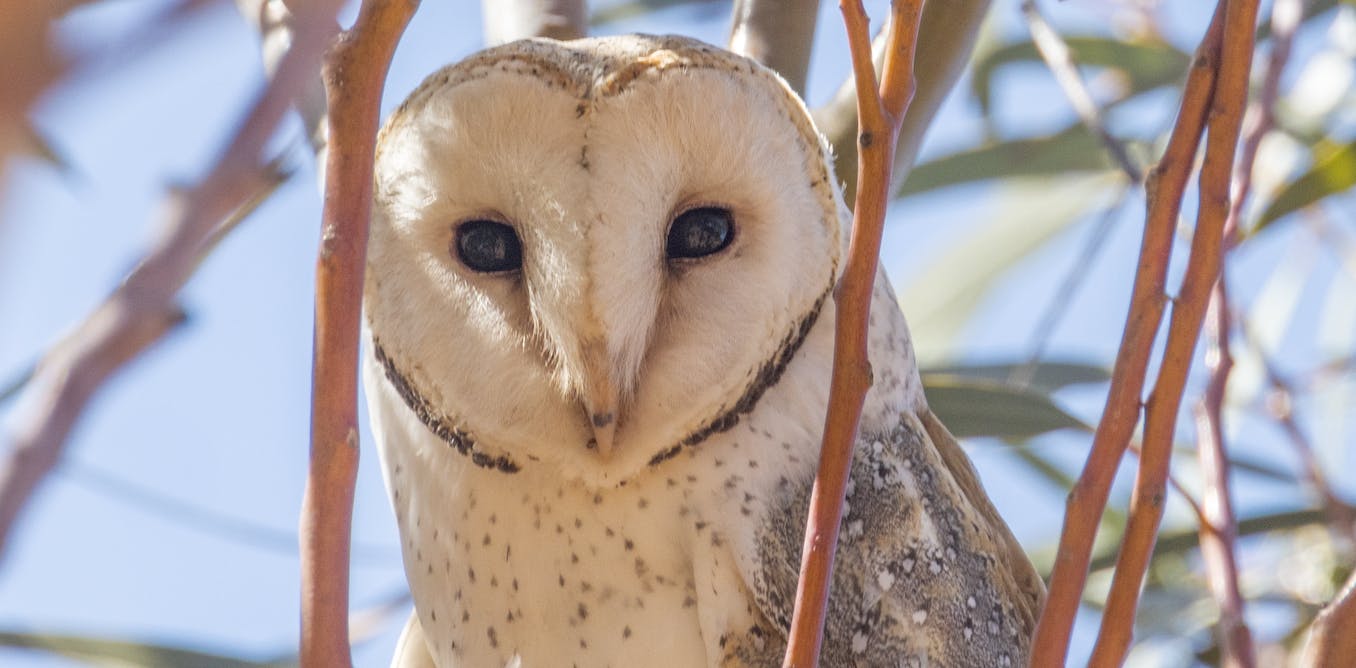Use of rat poison is leading to the wide-scale poisoning of Australia's nocturnal predatory birds, including the crowd favourite tawny frogmouth and Australia's largest owl, the majestic powerful owl.
Anticoagulant rat poisons are effective at killing rodents, but they also accumulate in the liver and muscle tissues of predators that eat the poisoned animals.
Our new research reveals alarming levels of rat poisons in our nocturnal predatory birds.
Given the high rate of exposure to rat poisons, it is likely predator populations will decline.
The common brushtail possum, with its broad diet and penchant for living in roof cavities, is no doubt directly feasting on rat poison.
So the high level of rat poison we found in nocturnal predators is likely the tip of a poisoned iceberg.
There is a very strong likelihood you will poison more than rodents - you could be poisoning a tawny frogmouth or owl.
Although I live in America, I work in pest control. And people often ask me to put out rat poison for them and I will always argue to them that they are harming more than just the rats. I start by asking them if they have any pets and of course, in this country 95% of people do. I remind them that if their pet eats the dead rat that they're going to poison their own pet. That usually ends the conversation, but there are always people who hate rats so much that they do not care how we exterminate them. At that point I basically refuse to put out poison for them. I instead offer them all kinds of traps that don't involve killing others in the food chain. If they don't like it then they are welcome to purchase these nasty chemicals online and do it themselves.
My company refuses to spray any flowers as well. We can't harm pollinators, they're too important. I've refused many customers who claim to be careful with chemicals and don't spray near my animals or children but want me to soak their flower beds. I'm like, let's talk about being chemical conscientious. It was one of the first questions I asked when I applied for the job and and they assured me, I will get in trouble if I do anything to harm pollinators or any other animals of any kind. We are only here to get rid of pests.
What do you normally do with scale or aphids. I have a meyer lemon tree with a localised aphid infestation and didn't spray until dusk, bit I have an olive with scale and sooty mould that I sprayed twice in a few days, in my area it's winter so no buds yet. What do you do for commercial pest control while being mindful of pollinators?
Can't really help you there as we do not treat trees at all. That's usually a job for an arborist. For the most part, we just don't put any chemicals near any pollinating plants. We also refuse to remove bee hives, in those cases we have a bee keeper who will come and relocate them to his farm.
There is an organic product we use for veggie gardens though called "Essentria" and it's basically rosemary oil with peppermint and thyme. It's effective to an extent but needs more regular applications. You might look that up. I'm not home right now but will check the label when I get home. It might have an application for trees.
Again I don't treat trees, we have an arborist we refer to for customers with tree problems.
Sorry I can't be more help, good luck.
It kinda shocks me how many brain cells it apparently takes to realise that if you poison an animal, anything that eats it is also going to end up with poison in its system
IMO We need to lift the quality of construction and waste management.
My workplace office building has bait stations all over the place because the doors are so poorly sealed that rodents can get in. Rubbish is left in a stinking open skip in the basement.
At minimum we should be banning all poisons with a half life of more than a couple of days. Ideally we wouldn't use any but that's probably a lot harder to convince people of, and it shouldn't be too hard to convince them to use the less damaging versions
https://4zzz.org.au/news/unintended-owl-poisoning
Unintended Owl Poisoning Sunday, 27 August 2023 by Toni Pankaluic Have you ever heard scratching noises at night in your home? or come across small, dark brown droppings? Eek… now you’ve seen a rat scurrying across your roof! So, you put out some rat poison. Well, owls and other animals may be unintended victims of your poison.
4ZZZ’s Eliot Rifkin chatted with Stefan Hattingh, an Environmental Officer about how to handle rodent eradication responsibly without killing owls.
for a deep dive...
Add your voice to Birdlife Australia’s open letter to Minister Murray Watt, to help get dangerous Second-generation Anticoagulant Rodenticides regulated properly in Australia. These rodenticide poisons are sold at supermarkets and you can find out just how potent they are here.
Here’s an article on Secondary Poisoning Risks from Rodenticides. Australia has 11 owl species, owls are raptors characterised by flat faces, large forward-facing eyes, sharp talons and beaks, upright stances and often circles of feathers under their eyes. Here’s an introduction to our owls and some more info specifically on the Powerful Owl.




